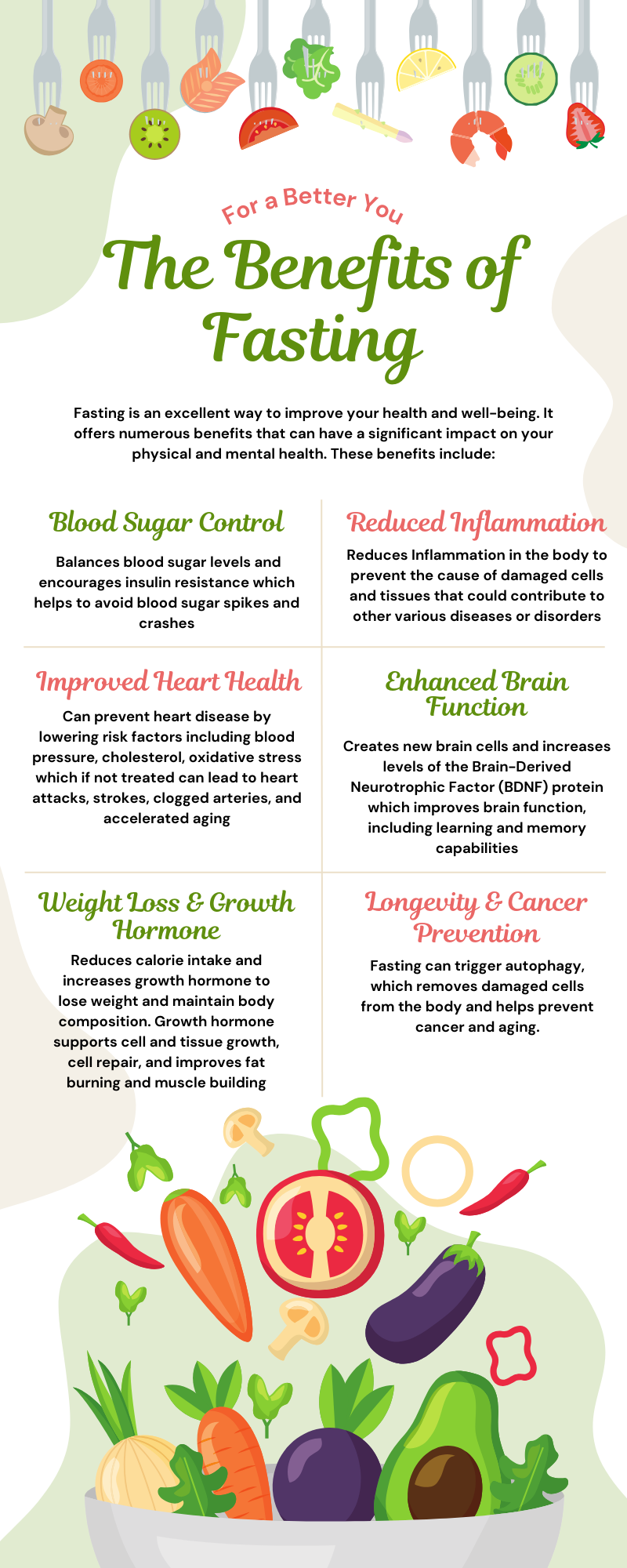What Are The Benefits of Fasting?

Fasting is the voluntary abstinence from food or drink for a certain period of time. It can range from a few hours to a few days, depending on the type and purpose of fasting. Fasting has been practiced for centuries by various cultures and religions, as a way of cleansing the body, mind, and spirit. But fasting can also have many health benefits, backed by scientific research. Here are some of the main benefits of fasting for your health and well-being.
Blood Sugar Control
Fasting can help improve blood sugar levels and insulin sensitivity, which are important factors for preventing and managing type 2 diabetes. Several studies have found that intermittent fasting, which involves cycling between periods of eating and fasting, can reduce blood sugar levels and increase insulin resistance. This means that your body can use glucose more efficiently and avoid spikes and crashes in your blood sugar levels. Fasting can also lower the risk of developing metabolic syndrome, a group of conditions that increase the likelihood of type 2 diabetes, heart disease, and stroke.
Inflammation Reduction
Inflammation is a natural immune response that helps fight off infections and injuries. However, chronic inflammation can cause damage to your cells and tissues, and contribute to various diseases, such as arthritis, asthma, cancer, and neurodegenerative disorders. Fasting can help reduce inflammation and promote better health. One review of 18 studies found that intermittent fasting could significantly reduce levels of C-reactive protein, a marker of inflammation. Another small study found that fasting for one year was more effective at decreasing inflammation and improving heart health than a control group.
Heart Health Improvement
Heart disease is the leading cause of death worldwide, and it is influenced by many factors, such as blood pressure, cholesterol, triglycerides, and oxidative stress. Fasting can help improve some of these risk factors and protect your heart health. For example, fasting can lower blood pressure, which reduces the strain on your heart and arteries. Fasting can also lower cholesterol and triglycerides, which are fats that can clog your blood vessels and cause heart attacks and strokes. Fasting can also reduce oxidative stress, which is a process that damages your cells and DNA, and contributes to aging and disease.
Brain Function Enhancement
Fasting has various positive effects on your brain function and mental health. It can stimulate the production of new brain cells, which can enhance your learning and memory capabilities. Additionally, fasting can boost the levels of brain-derived neurotrophic factor (BDNF), a protein that supports the growth and survival of neurons and protects them from degeneration. Moreover, fasting increases the levels of ketones, which are molecules produced by your body when it breaks down fat for energy. Ketones can provide an alternative fuel source for your brain, and may improve your mood, cognition, and alertness.
Weight Loss and Growth Hormone
Fasting is a method that can help you lose weight and maintain a healthy body composition. This is because when you fast, you consume fewer calories than you burn, creating a calorie deficit that leads to weight loss. In addition, fasting can increase your metabolic rate, which means that you burn more calories even when you’re at rest. Fasting can also help preserve your muscle mass while burning fat. Furthermore, fasting can boost the levels of growth hormone, which is responsible for cell and tissue growth and repair, and can improve your ability to burn fat and build muscle.
Longevity and Cancer Prevention
Fasting can also help you live longer and prevent some types of cancer. Fasting can activate a process called autophagy, which is the removal of damaged and dysfunctional cells and molecules from your body. Autophagy can prevent the accumulation of waste and toxins, and protect your cells from aging and disease. Fasting can also modulate the expression of genes that are involved in longevity and cancer. Fasting can also make cancer cells more sensitive to chemotherapy and radiation, and reduce the side effects of these treatments.
Bottom Line
Fasting is a practice that can have positive effects on your health and well-being. Fasting can help improve your blood sugar control, inflammation, heart health, brain function, weight loss, growth hormone, longevity, and cancer prevention. However, fasting is not for everyone, and it can have some side effects and risks. Therefore, you should consult your doctor before starting any fasting regimen, and choose the type of fasting that works best for you. You should also drink plenty of water and fluids, and eat healthy and balanced meals during your eating periods. Fasting can be a powerful tool to enhance your health and well-being, if done correctly and safely.

